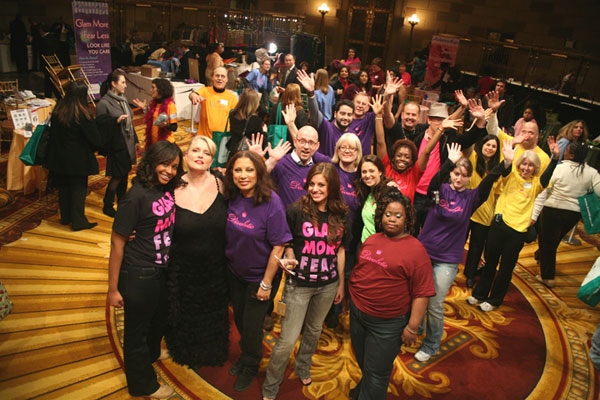ince many of you might be watching the Luther: Never Too Much documentary on CNN, I wanted to take a moment to share a bit about my journey. After discovering Luther, after he suffered a stroke due to mismanaged type 2 diabetes, I felt driven to become a diabetes advocate.
I joined Luther’s mother, Mrs. Mary Ida Vandross, on the promotional tour for Luther’s album, Dance With My Father. Sadly, Luther suffered a stroke related to mismanaged type 2 diabetes before the album’s release.
It was a meaningful time as I shared updates about health with the media. After the tour wrapped up, I asked Mrs. Vandross if she’d be interested in participating in the first PSA for Divabetic, produced by my dear friend, Gay Ball O’Brien. Our shared loss made us a powerful team advocating for diabetes education and stroke prevention.
This path led me to found Divabetic.Org, a nonprofit dedicated to reaching out to those at risk, impacted by, and living with diabetes.
The phrase Divabetic is a combination of the word ‘diabetic’ with a ‘V’ for Vandross to celebrate all the divas that Luther loved.
Patti LaBelle, living well with type 2 diabetes, inspired me one night during a Luther Tribute concert in New York City. In the middle of her performance, she boldly declared, “I have diabetes. Diabetes doesn’t have me,” which really struck a chord with me. Her confidence and glamour made me think, “She’s not just a diabetic; she’s a diva!”
When I got home after the concert, I felt inspired to jot down the word “diabetic” in black ink and cleverly add a ‘v’ in red ink. At that moment, it hit me that the ‘v’ stands for Vandross!

A few months later, when I traveled to Philadelphia with Luther to visit his mother, Mrs. Mary Ida Vandross, guess who was there? Patti LaBelle!

I was thrilled to present her with the first Divabetic t-shirt and share how much she had motivated me. Over the years, she’s graciously called herself a ‘Divabetic,’ and it’s such an honor!
The mission of Divabetic is to transform lives by changing attitudes, boosting spirits, and encouraging hope and motivation for those living with, affected by, or at risk of diabetes.
I couldn’t turn my back on what happened; instead, I became determined to help Luther’s fans and others learn to keep their house a home and stay healthy.
I focus on preventing diabetes complications, promoting a team approach to self-management, and educating everyone about handling unexpected self-care crises.
Luther suffered a stroke in April 2003, and by November, I was busy selling Divabetic t-shirts with the slogan “Sugar’s The Bitch Not Me” to raise funds for diabetes organizations.
I also volunteered on the national diabetes TV show, d-life, and started offering free coaching classes with two inspiring women who live with type 1 diabetes.
Fast forward to 2006, and I was out there participating in health fairs across NYC, including the Apollo Theater. I hosted monthly diabetes education meetings with a certified educator and launched my first major program, Divabetic – Makeover Your Diabetes, with support from Novo Nordisk.
Over the next two years, my program gained recognition, becoming the highest-rated diabetes program for Novo Nordisk worldwide!
I continued to bring unique diabetes outreach to major cities, started a podcast, and created ‘man on the street’ videos to empower those living with diabetes.
I created the carbohydrate counting game, Carb Kitty, published the ebook, Sweet Romance: A Woman’s Guide to Love And Intimacy With Diabetes, and presented the art installation and outreach event, Plate Poetry, focused on emotional eating.
Divabetic’s Diabetes Plate Poetry “What’ s on Your Plate?” video describes the emotional experience of living with diabetes. An important component of diabetes self-management, but often unaddressed, is the topic of emotional well being.
The Divabetic Club empowers those living with diabetes through media to manage their lives in healthier ways. People living with diabetes face numerous challenges in managing their disease on a day- to- day basis. Divabetic wants to encourage these individuals to stay positive and healthy in their self-management.
Our mission to glamorize good health combines fitness, nutrition, style and positive energy.
Divabetic’s Luther Vandross Tribute podcasts aim to celebrate Luther’s musical legacay, share information on the emotions associated with managing diabetes and the underlying reasons attributed to those emotions, and encourage people to ‘keep their house a home’ by learning to prevent diabetes health-related complications from occurring.
I’ve had the pleasure of creating ten Divabetic mystery podcasts with the amazing Best-Selling Author Tonya Kappes!
It’s been such a rewarding experience to empower others through storytelling. Our goal is to encourage listeners to think like detectives when it comes to self-care issues. We help them search for clues regarding unexpected high and low blood sugar readings and report back to their healthcare providers.

After facing challenges, including being unwelcome at a prominent church for being gay, I found support in my volleyball league, Gotham Volleyball.
I launched the Coming Out Project to help others embrace their identities.
In 2017, after Alfa Anderson’s album release (featuring her When Luther Sings tribute song, I organized reunion concerts at Ashford & Simpson’s Sugar Bar in NYC to celebrate Luther’s musical family resulting in the creation of FANDROSS.
I also produced several Luther Tribute podcasts featuring Luther’s friends, peers, collaborators and health educators.

Working with Luther Vandross also inspired me musically. My first foray into lyric writing led to the Billboard Dance Chartting single, That Man Of Mine, with singer songwriter, Cindy Mizelle and backing vocals by Brenda White-King.
I co-wrote UK Soul Chart hit, Mama’s Kitchen Table and the holiday breakup ballad, Pink Champagne with musician, songwriter, producer Ivan Hampden Jr. and singer, songwriter Paulette McWilliams.
I teamed up with the dynamatic sister duo, Crystal Penny, and Ivan Hampden Jr., to pen, Standards, my tribule to the legendary female vocalists whose music compose the soundtrack of my life.
So, thank you all for your concern—I’m doing well, staying busy, and ready to present more diabetes outreach with dazzle this year

























